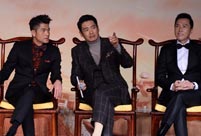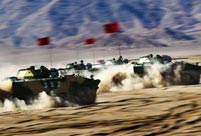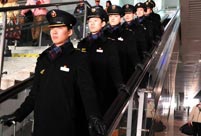 Cockfighting show staged in E. China's Heze during Spring Festival
Cockfighting show staged in E. China's Heze during Spring Festival
 Chinese New Year Flower Fair opens in San Francisco
Chinese New Year Flower Fair opens in San Francisco
 Festivities in Shanghai
Festivities in Shanghai
 PLA navy conducts drill in North China Sea
PLA navy conducts drill in North China Sea
 World's high-tech hotels
World's high-tech hotels
 Li Na poses with trophy on Brighton Beach in Melbourne
Li Na poses with trophy on Brighton Beach in Melbourne
 Six Chinese divers back safely after 300-meter saturation dive
Six Chinese divers back safely after 300-meter saturation dive
 Traditional wedding ceremony of Yao people
Traditional wedding ceremony of Yao people
 Taipei Game Show attracts geeky gamers
Taipei Game Show attracts geeky gamers
BEIJING, Jan. 30 -- Chinese people prefer a tone of optimism during Spring Festival, China's celebration of lunar New Year, but the year of horse, off and running on Friday, is kicking up some dust.
In the 12-year cycle of the Chinese zodiac, the horse symbolizes courage and strength, persistence and hardship. The horse has been the anchor of people's endeavors to surpass their physical limitations since ancient agrarian times.
This year is also known as "Jiawu" according to a traditional Chinese system, with 10 heavenly stems are used as serial numbers in combination with 12 earthly branches designating years, months, days and hours. The system is believed to have been used as early as the Shang Dynasty (17th Century B.C.-11th Century B.C.), the second dynasty of Chinese history.
As the system rules, every 60 years make an era, which is long enough to leave much space for reflection among Chinese, over the centuries.
SHADOW OF THE PAST
Two such cycles ago in the "Jiawu" of 1894, the first Sino-Japanese war broke out. The Japanese navy defeated the fleet of the Qing Dynasty (1644-1911). It was the first time that China had lost to Japan in a military conflict.
The Qing Dynasty not only suffered enormous economic and territorial losses, but missed the chance to modernize itself as the Westernization Movement was halted.
Japan, swamped in an economic recession before the war, had its territorial ambitions fueled by war indemnities from China and occupation of Taiwan, making it the most powerful nation in Asia. And 37 years later, it waged another war on China during WWII.
The 1894 failure triggered a series of patriotic movements competing to restore the Middle Kingdom's glory. Sun Yet-sen, a doctor in his 20s, founded Hsing-chung Hui (Society for Regenerating China) at the end of the year, in Hawaii.
The society, predecessor of the Kuomintang, or Nationalist Party, aimed to overthrow the Qing Dynasty and bringing China back to the path of modernization. In 1894, Mao Zedong was one year old.
When people look back into history, it is no surprise that China and the Republic of Korea (ROK) are revolted by Japanese Prime Minister Shinzo Abe's December visit to the Yasukuni Shrine, and Japan's announcement that teaching manuals for high schools would show Japanese sovereignty over many disputed islands, including China's Diaoyu Islands.
Japan's relations with China and the ROK are tense due to disputes over territorial and historical issues. The history textbook revision is one of many obstacles between Japan and its neighbors, as it demonstrates Japan's attitude towards its aggressive past.
Both born in 1954, another year of "Jiawu", Abe and German Chancellor Angela Merkel represent entirely different attitudes towards their countries' pasts. Germany has won approval from many for the sincerity its leaders have shown, but Japan still has a long way to go.
In the year of horse, Sino-Japanese relationship will require leaders from both sides to demonstrate wisdom and understanding.

 3D film 'The Monkey King' premieres in Beijing
3D film 'The Monkey King' premieres in Beijing  Miss Chinese Int'l Pageant 2014 held in Hong Kong
Miss Chinese Int'l Pageant 2014 held in Hong Kong 'Golden Flowers' in the Spring Festival travel rush
'Golden Flowers' in the Spring Festival travel rush Li Na beats Cibulkova to win Australian Open
Li Na beats Cibulkova to win Australian Open Sexy models at Taipei Game Show 2014
Sexy models at Taipei Game Show 2014 'Living in ice house' competition held in central China
'Living in ice house' competition held in central China  Highlights of Chinese airborne troops'exercises
Highlights of Chinese airborne troops'exercises  All-male high speed train crew during Spring Festival travel rush
All-male high speed train crew during Spring Festival travel rush PLA navy drills in East China Sea
PLA navy drills in East China Sea President Xi visits border troops ahead of Lunar New Year
President Xi visits border troops ahead of Lunar New Year What do Chinese pack in their luggage in Spring Festival Rush?
What do Chinese pack in their luggage in Spring Festival Rush? Blind date fair in Hangzhou of Zhejiang province
Blind date fair in Hangzhou of Zhejiang province Film 'Where Are We Going, Dad' premiered in Beijing
Film 'Where Are We Going, Dad' premiered in Beijing  Australian Open champion Li Na returns to hometown Wuhan
Australian Open champion Li Na returns to hometown Wuhan Twin sisters serve during Spring Festival travel rush for the first time
Twin sisters serve during Spring Festival travel rush for the first timeDay|Week|Month